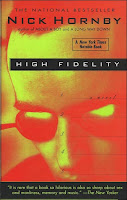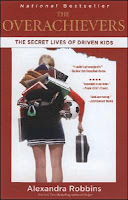 The next book I'm reading is Nick Hornby's latest, Slam. I just started it this morning on the bus. I've read most of Hornby's books: High Fidelity, About A Boy, How to Be Good and Fever Pitch. Obviously, I enjoy his work. High Fidelity was my first contact with his writing. The movie had already come out,
The next book I'm reading is Nick Hornby's latest, Slam. I just started it this morning on the bus. I've read most of Hornby's books: High Fidelity, About A Boy, How to Be Good and Fever Pitch. Obviously, I enjoy his work. High Fidelity was my first contact with his writing. The movie had already come out, I w
as semi-interested in it, but I decided to read the book first. It grabbed me from the beginning. Not only do I like reading British books, but Hornby's writing is very entertaining. He can speak from the male perspective well, and isn't afraid to write what men are really thinking (this is what I've heard and how it seems to me, since I'm of the opposite gender, I don't know first hand). There were so many situations in the book that were real to me - the way men may fantasize about other women, but how those fantasies "don't deliver" like the person they're really with and who they truly love. While the movie is set stateside, and Rob is played by the American John Cusack, it's perfectly done as well, and one of my most favorite, most quotable movies.
About A Boy was a similar experience for me. The book was engaging and hilarious. I went out and bought it shortly after I read High Fidelity. And when I heard they were making a movie, and an English flick at that, I was excited. And that movie delivered as well. Hornby has a way of making the most painful situations turn out to be heart-warming. While the boy's mother attempts suicide, the boy's reaction is true and realistic. His need for male companionship is gut-wrenching, but the events that ensue are hilarious. And just the thought of a young kid reaching in and melting the cold exterior of a self-absorbed man-boy is very hopeful.
In How to Be Good, Hornby took a detour and wrote from the female perspective. While the book was still entertaining, I wasn't as enthralled as with the other two, and I honestly have a hard time remembering what it was about. Fever Pitch, Hornby's memoir of his love of futbol/soccer, is also great. He's back in his natural style of speaking from the male side of things. He's obsessed with the sport - obsessed. Being someone who has also been obsessed with different things at different times in my life, I could totally relate once again. I'm anxious to see if Slam will captivate me the same way - will I truly care about a skateboarding teenager who talks to his poster of Tony Hawk? I'll let you know.
I finished The Overachievers last night. I thoroughly enjoyed it. At the end of the book, Robbins gives her own list of tactics that schools, teachers, parents and students could use to help bring this overachiever mentality under control. By the end, as a reader you know where Robbins stands on this issue. I can understand why some readers may not appreciate her personal opinions showing through, but in this case, I'm fine with it. While I don't want to spoil the book for anyone, one of Robbins suggestions made a lot of sense: Teachers could assign test days for their particular subject - Physics on Monday, English on Tuesday, Math on Wednesday, etc.
So often students end up with midterms, projects and papers due within the same week, or even worse, on the same day. While I understand the importance of learning time management and the ability to multi-task, I think by knowing tests would at least fall one day apart, would help students study better and, in the end, perform better. I also understand that in college and the "real world" your deadlines won't be assigned this way. But, maybe a variation of this system would be beneficial and help teachers understand that their classes aren't the only ones these students are taking?
One other real life situation that I've paid more attention to since starting the book is the Academic All-Stars that a local news station hypes each week. More often than not, these students have 4.0+ GPAs (weighted GPAs, seriously?), volunteer, play sports, play an instrument, are in the National Honor Society and so on. While I think it's great to publicize these student's achievements, these past few weeks I've wondered if on the inside these students are depressed, frustrated, stressed or lonely. Are they slamming Red Bulls to get through the day? What messages do these news spots send to fellow students who "only" have a 3.5 GPA and play just one sport really well? That they're not good enough?
I love when the books I read, especially nonfiction books, pertain to my daily life. This afternoon I learned that my 7-year-old niece has about an hour of homework each night - in first grade! Maybe I'm wrong, but I don't think I had homework in first grade. Maybe a project here and there, but every night?
I told my sister-in-law about The Overachievers, and how, in the end, I think all the homework (I'm talking about busy-work homework, not math skills, sentence structure and things you just need to know), the grades, the numerous activities, don't matter so much. As long as you strive to do your best and develop important social skills, you can succeed in life.
And not only is this hour of first-grade homework each night affecting the student, but the parent also has to sit with him or her and help out. Which they should. But add on two, three or four more kids, and that's a lot of time taken away from family time, play time, or as they get older, bed time. My sister-in-law did make a good point though. The homework is only going to increase from here, so she's glad my niece is learning the discipline of doing homework now, even if it is first grade.
Another portion of the book I found very interesting had to do with sleep habits of teenagers. Robbins fills in all the facts very well, but in general, a teenager needs more sleep than a younger child or an adult. In addition, teenagers naturally stay awake later. However, high schools start around 7:30. So, teens are staying up late to get their homework done - or just because hormonal imbalances make it hard for them to fall asleep earlier than 11 p.m. - and still have to rise before the sun. I was proud when Robbins called out Edina and Minneapolis school districts as systems that changed their high school start times by an hour. What did they discover? After some time, they were left with happier, less moody, healthier kids who were participating in class and getting their homework done on time.
 I'm almost done with The Overachievers, by Alexandra Robbins. If anyone has read Pledged, The Secret Life of Sororities, also by Robbins, and enjoyed it, you'll like this book, too. Robbins has a way of integrating herself into a culture, painting a picture of what life is like for the participants. However, she can also take herself out and talk directly to the reader. Robbins has been criticized for being biased in her writing, but this doesn't bother me much. Maybe because I always agree with her.
I'm almost done with The Overachievers, by Alexandra Robbins. If anyone has read Pledged, The Secret Life of Sororities, also by Robbins, and enjoyed it, you'll like this book, too. Robbins has a way of integrating herself into a culture, painting a picture of what life is like for the participants. However, she can also take herself out and talk directly to the reader. Robbins has been criticized for being biased in her writing, but this doesn't bother me much. Maybe because I always agree with her.
The Overachievers follows a group of high school students who strive for straight A's, throw themselves into numerous extracurricular activities, stay up late studying, take the SATs multiple times - all to make themselves look well-rounded and superior on their college applications, in return fighting depression, stress, sleep deprivation and peer pressure . While these kids push themselves to be perfect, they're not the only ones. Robbins examines parental pressure on kids, parental pressure on teachers, administrative pressure on teachers, college admissions pressure on administrators and government pressures (No Child Left Behind). Robbins also goes back to the beginning, when expecting parents put the name of their unborn child on the waiting list for their city's best, private preschool.
The book is comprehensive and full of facts, but reads like a novel. As someone who did well in high school and college, made friends, played in band, etc., I was also told just to do my best. In the end, grades don't matter all that much. Happiness comes from somewhere else.
I read a lot, probably two or three books each month, in addition to several magazines, blogs and online news sources. I'm a journalist, so reading comes with the gig. Because I consume so many different stories each day, week and month, I can't keep track of it all. Plus, I love to share with others about what I read, hear what they have to say, and receive recommendations.
As I was reading my latest book last night, sharing my thoughts on it with my hubby (J), he said, "You should have a book blog." A very good idea (he has many). So, here I am. To share about what I'm reading, or what I've read, with whoever's interested. Sometimes it'll be nonfiction, sometimes it'll be escape-type fiction; a news story here, a review there. We'll see where the pages take me.